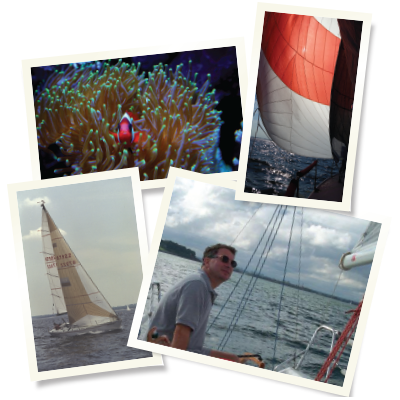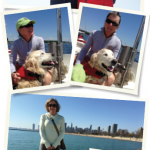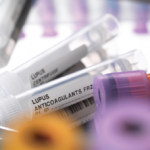
Top left: Clown fish residing in a bubble tip anemone in the Furie home.
Top right: Dr. Furie sailing under spinnaker into the sunset on Long Island Sound.
Bottom left: Dr. Furie skippering during a race on Long Island Sound. Says his wife, “You spent more time naming your boats than your children.”
Bottom right: Dr. Furie attends to main sail trim during a race.
alexwhite / SHUTTERSTOCK.COM
Rich Furie, MD, chief of rheumatology at Northwell Health in Long Island, N.Y., loves the ocean. At age 16, Dr. Furie inherited a summer sailing business started by his two older brothers, which Dr. Furie kept profitable for nine years. The young entrepreneurs named their fledgling company Furie Sailing, which offered sailing lessons and sailboat rentals.
The family’s vacation home was on Little Egg Harbor Bay, which sits about five miles off the coast of New Jersey. Its backyard was stocked with five boats—a 12′ Sailfish, a 14′ Sunfish his brothers built in high school woodshop class and several daysailors.
“When my oldest brother was about 16 and got a job around the corner from where we lived washing dishes for $0.67 an hour, he decided after two days he didn’t like washing dishes and started giving sailing lessons on my father’s 20′ sailboat for about $3 an hour,” recalls Dr. Furie. “There was no other place to rent sailboats on the island.”
Nearly 50 years later, it’s hard for Dr. Furie to watch sailboats on the Atlantic without feeling a twinge of envy. Over the decades, he’s won more sailboat races than he can remember and attributes his mechanical, carpentry and even seamstress skills to the demands of his family’s business. Although his busy medical career and expanding family now occupy much of his time, he’ll always find time for sailing, which he calls his favorite “cerebral” hobby.
Developing into a Doctor & Sailor
Dr. Furie always wanted a science career in medicine. Perhaps that’s because his father, also a sailor, was an orthodontist, his oldest brother is a hematologist and middle brother is a retired dentist.
While attending Cornell University, Dr. Furie served as captain of the school’s freshman sailing team. Then he moved on to Weill Cornell Medical College—now called Weill Cornell Medicine—and graduated in 1979. He completed his internship and residency at New York Hospital from 1979–1982, and then pursued a fellowship in rheumatology at the Hospital for Special Surgery from 1982–1984.
The following year, he began working as a rheumatologist at Northwell Health, holding numerous academic and hospital appointments, including faculty positions at Weill Cornell Medical College, the Albert Einstein College of Medicine and the Hofstra Northwell School of Medicine.
Dr. Furie says the family business was handed to him after his brothers left for college. Although it completely paid for their college and graduate school tuitions, he vividly recalls how he couldn’t wait to go back to school at the end of each summer.
“It was a very difficult job, basically 8 a.m.–8 p.m., seven days a week, dealing with people on vacation who overestimated their skills,” he says, adding that the flotilla, which peaked at 35 rental boats, was a lot to oversee. “We were always out looking for lost boats. College looked easy compared to this.”
Still, he worked every summer through his second year in medical school. Then, after nine years of managing the business, he called it quits. He and his brothers sold the business to a former sailing instructor, and the property to the Spray Beach Yacht Club next door.
Since then, sailing has remained a big part of Dr. Furie’s life. In 1985, he moved his wife and two sons to Manhasset, N.Y., on Long Island, where he could live, work and sail within a few miles’ radius.
Some of his fondest memories involve a former sailing student and an instructor he hired. The junior high school student, Martin Bergman, became a rheumatologist in Pennsylvania and once introduced Dr. Furie as his sailing instructor at a national rheumatology meeting. The instructor, Gregory Mankiw, moved on to serve as chairman of the Council of Economic Advisers for President George H.W. Bush and mentioned his job as a sailing instructor in his White House biography.
Trophies & Aquariums
Not surprisingly, Dr. Furie’s home is filled with racing trophies. One of his favorite wins was the Manhasset Bay Fall series, which attracts top competitors from the East Coast.
Dr. Furie believes sailing and medicine have much in common. Sailboat racing, for example, is highly competitive. So is medical research, which involves competing for grants and awards and achieving recognition as a top investigative site.
Likewise, both pursuits are cerebral occupations. Sailors must understand the physics of the sails and wind, for instance. Then there’s teamwork, leadership and strategy skills, which both professions rely on to succeed.
Dr. Furie stopped racing sailboats years ago because of his grueling work schedule and the difficulty of finding experienced sailors who could devote consecutive weekends to racing. But that hasn’t prevented him from enjoying his 26′ sailboat during the summer months. Five years ago, he and two other rheumatologists and a neurophysiologist rented a 50′ sailboat for one week and sailed around the Caribbean.
“Saltwater runs in my blood,” he says, adding that since medical school, he’s also owned saltwater aquariums.
Years ago, he developed a reputation as a saltwater fish connoisseur among the local medical community and captured the attention of a physician named Joshua Lederberg, who won the Noble Prize in 1958 for his work in genetic structure and function in microorganisms. Dr. Lederberg was moving from California to New York to accept the position of president of Rockefeller University. He contacted Dr. Furie for tips on moving his son’s saltwater aquarium across the country.
Over the years, Dr. Furie’s saltwater hobbies have lent balance to his active life, and he offers a tip to young physicians: “Try to develop hobbies when you’re young,” Dr. Furie says. “As you get older, it’s harder to do because there are too many demands on your time.”
Carol Patton is a freelance writer based in Las Vegas.




